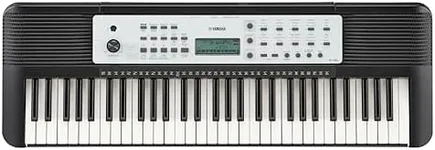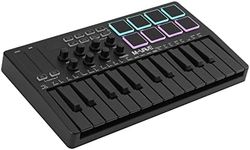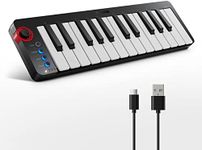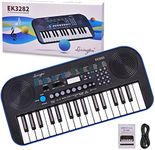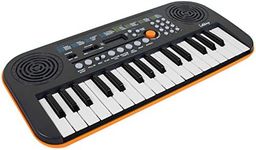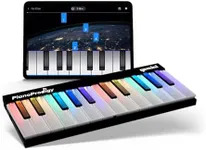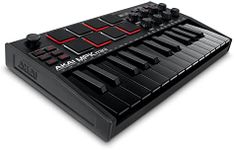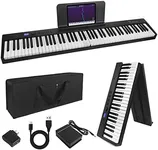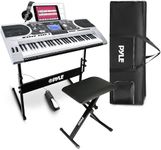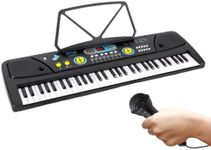Buying Guide for the Best Mini Piano Keyboard
Choosing the right mini-piano keyboard can be a fun and rewarding experience, especially if you know what to look for. Mini-piano keyboards are compact and portable, making them ideal for beginners, children, or musicians on the go. When selecting a mini-piano keyboard, it's important to consider several key specifications to ensure you get the best fit for your needs. Here are the key specs to consider and how to navigate them.Number of KeysThe number of keys on a mini-piano keyboard can vary, typically ranging from 25 to 49 keys. This spec is important because it determines the range of notes you can play. If you're a beginner or buying for a child, a keyboard with 25 to 32 keys might be sufficient for learning basic melodies and chords. For more advanced players or those who want to play more complex pieces, a keyboard with 37 to 49 keys would be more suitable. Consider your skill level and the type of music you want to play when choosing the number of keys.
Key SizeKey size refers to the dimensions of the keys on the keyboard. Mini-piano keyboards often have smaller keys than full-sized pianos, which can be easier for children or those with smaller hands to play. However, if you are an adult or have larger hands, you might prefer a keyboard with full-sized keys to avoid discomfort and improve playability. Think about who will be using the keyboard and their hand size when deciding on key size.
Touch SensitivityTouch sensitivity means that the keyboard responds to how hard or soft you press the keys, producing louder or softer sounds accordingly. This feature is important for developing proper playing technique and for expressive playing. Some mini-piano keyboards have touch-sensitive keys, while others do not. If you are serious about learning to play the piano or want a more realistic playing experience, look for a keyboard with touch sensitivity. If it's for casual use or very young children, this feature might be less critical.
Built-in Sounds and FeaturesMany mini-piano keyboards come with a variety of built-in sounds and features, such as different instrument voices, rhythms, and effects. These can make playing more fun and engaging, especially for beginners. If you or the intended user enjoys experimenting with different sounds and styles, look for a keyboard with a wide range of built-in features. However, if you prefer a more straightforward piano experience, a keyboard with fewer features might be more appropriate.
PortabilityPortability is a key advantage of mini-piano keyboards. Consider the weight and size of the keyboard, especially if you plan to travel with it or move it frequently. Some models are designed to be ultra-portable and can even run on batteries, making them ideal for outdoor use or for taking to lessons. If you need a keyboard that is easy to carry around, look for a lightweight and compact model. If it will mostly stay in one place, portability might be less of a concern.
ConnectivityConnectivity options, such as USB or MIDI ports, allow you to connect the keyboard to a computer or other devices for recording, composing, or using music software. This can be important for more advanced users or those interested in music production. If you plan to use the keyboard with other devices, make sure it has the necessary connectivity options. For basic practice and learning, connectivity might not be as crucial.
